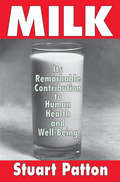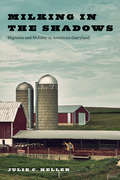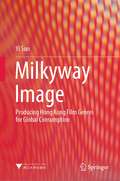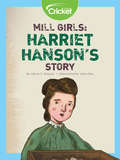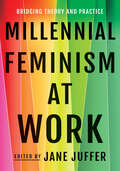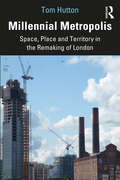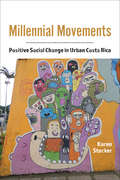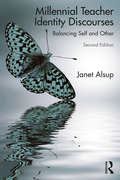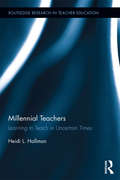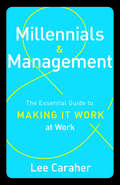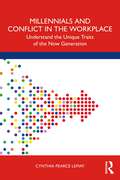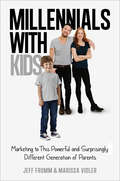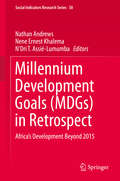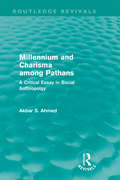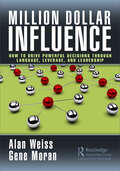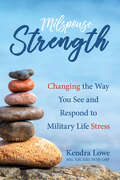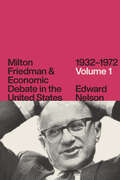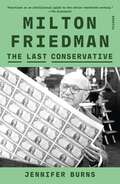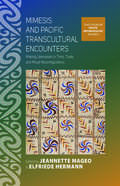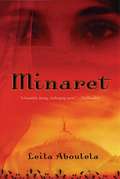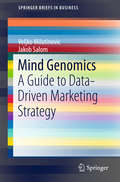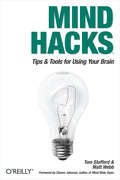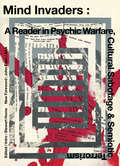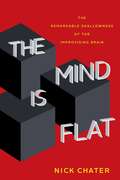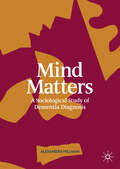- Table View
- List View
Milk: Its Remarkable Contribution to Human Health and Well-being
by Stuart PattonMilk is the one food that sustains life and promotes growth in all newborn mammals, including the human infant. By its very nature, milk is nutritious. Despite this, it has received surprisingly little attention from those interested in the cultural impact of food. In this fascinating volume, Stuart Patton convincingly argues that milk has become of such importance and has so many health and cultural implications that everyone should have a basic understanding of it. This book provides this much-needed introduction. Patton's approach to his subject is comprehensive. He begins with how milk is made in the lactating cell, and proceeds to the basics of cheese making and ice cream manufacture. He also gives extensive consideration to human milk, including breasts, lactation, and infant feeding. Pro and con arguments about the healthfulness of cows' milk are discussed at length and with documentation. Patton explores the growing gap between the public's impressions of milk, and known facts about milk and dairy foods. He argues that the layperson's understanding of milk has deteriorated as a result of propaganda from activists anxious to destroy milk's favorable image, misinformation in the media, and scare implications from medical research hypotheses.
Milking in the Shadows: Migrants and Mobility in America’s Dairyland (Inequality at Work: Perspectives on Race, Gender, Class, and Labor)
by Julie C. KellerMigrant workers live in a transnational world that spans the boundaries of nation-states. Yet for undocumented workers, this world is complicated by inflexible immigration policies and the ever-present threat of enforcement. Workers labeled as “illegals” wrestle with restrictive immigration policies, evading border patrol and local police as they risk their lives to achieve economic stability for their families. For this group of workers, whose lives in the U.S. are largely defined by their tenuous legal status, the sacrifices they make to get ahead entail long periods of waiting, extended separation from family, and above all, tremendous uncertainty around a freedom that many of us take for granted—everyday mobility. In Milking in the Shadows, Julie Keller takes an in-depth look at a population of undocumented migrants working in the American dairy industry to understand the components of this labor system. This book offers a framework for understanding the disjuncture between the labor desired by employers and life as an undocumented worker in America today.
Milkyway Image: Producing Hong Kong Film Genres for Global Consumption
by Yi SunThis book adopts an integrative research framework that primarily combines industrial and discourse analysis to investigate the company Milkyway Image, drawing upon literature that studies film studios and the practices of film production, distribution, and reception. The history of the Hong Kong-based film production company Milkyway Image from its founding in 1996 to the present exemplifies the metamorphosis of the post-return Hong Kong film industry to an era characterised by Hong Kong’s integration into a Chinese national context and the transnationalisation of world cinema. It shows that contemporary Hong Kong cinema’s transition resists a monolithic chronicle and instead represents a narrative combining the perspectives of different interest groups and a complex process of compliance and resistance, negotiation and contestation. The meaning of Milkyway’s films shifts as they are circulated across cultures and viewed within diverse frameworks, and our understanding of Hong Kong cinema is subject to varying contexts and historical configurations. For researchers in film and media studies and those who have a general interest in Hong Kong cinema, Asian cinema, or contemporary film culture, this book reveals how a variety of industry and cultural bodies have become co-creators of meaning for a film production house, and how the company operates as a co-creator of the discourse that surrounds it.
Mill Girls: Harriet Hanson's Story
by Alicia Z. KlepeisMill girl Harriet Jane Hanson worked in the booming textile mills of Lowell, Massachusetts, in the 1830s.
Millennial Feminism at Work: Bridging Theory and Practice
by Jane JufferIn Millennial Feminism at Work, volume editor Jane Juffer brings together recently graduated students from across the US to reflect on the relevance of their feminist studies programs in their chosen career paths. The result is a dynamic collection of voices, shaking up preconceived ideas and showing the positive influence of gender and sexuality studies on individuals at work.Encompassing five areas—corporate, education, nonprofit, medical, and media careers—these engaging essays use personal experiences to analyze the pressure on young adults to define themselves through creative work, even when that job may not sustain them financially. Obstacles to feminist work conditions notwithstanding, they urge readers to never downplay their feminist credentials and prove that gender and sexuality studies degrees can serve graduates well in the current marketplace and prepare them for life outside of their alma mater. Emphasizing the importance of individual stories situated within political and economic structures, Millennial Feminism at Work provides spirited collective advice and a unique window into the lives and careers of young feminists sharing the lessons they have learned.Contributors: Rose Al Abosy, Rachel Cromidas, Lauren Danzig, Sadaf Ferdowsi, Reina Gattuso, Jael Goldfine, Sassafras Lowrey, Alissa Medina, Samuel Naimi, Stephanie Newman, Justine Parkin, Lily Pierce, Kate Poor, Laura Ramos-Jaimes, Savannah Taylor, Addie Tsai, Hayley Zablotsky
Millennial Metropolis: Space, Place and Territory in the Remaking of London
by Tom HuttonThe text offers a critical perspective on complex and consequential aspects of growth and change in London, viewed through the lens of multiscalar space and brought to life through exemplary case studies. It demonstrates how capital, culture and governance have combined to reproduce London, within a frame of relational geographies and historical relayering. Emphasis is placed on the sequences of political change, capital intensification, industrial restructuring and cultural infusions which have transformed space in London since the 1980s. Tom Hutton contributes to the rich discourse on London’s experiences of urbanization, by producing a fresh perspective on its development saliency. Millennial Metropolis includes a systematic review and synthesis of research literatures on globalizing cities, with reference to the reproduction of space at the metropolitan, district and neighbourhood scales. Hutton offers a nuanced treatment of geographical scale, observed in the blending of global/transnational processes with the fine-grained imprint of governance processes and social relations. These proccesses are manifested in sites of innovation, spectacle and social conviviality, but also produce experiences of displacement and inequality. The author presents a spatial model of metropolitan development by exploring how growth and change in twenty-first-century London is expressed internally as an enlarged zonal structure extending beyond the traditional territories of central and inner London. Serious threats to London are discussed —from the isolating implications of Brexit, the impact of the Covid-19 pandemic and the dire threat of ecological crises and deteriorating public health associated with climate change. This will be an invaluable text for postgraduate students, established scholars and upper level undergraduates, across diverse disciplines and fields including geography, sociology, governance studies and planning and urban studies.
Millennial Movements: Positive Social Change in Urban Costa Rica (Teaching Culture: UTP Ethnographies for the Classroom)
by Karen StockerThrough social movements that are both grassroots and global, young leaders in San José, Costa Rica, have sought to create positive social change in their communities. Using social media, art, local organizations, corporations, and government entities, these leaders have found creative ways to connect with and support one another’s efforts to promote change and tackle growing concerns, including environmental sustainability, freedom from sexual assault, food security, LGBTQ+ rights, and more. Presenting case studies of Costa Rican millennial leaders, Millennial Movements shows how youth activists in San José draw from global solutions to address the local problems inhabiting their city. Identifying with the youths that they encounter in each chapter, students will be inspired by the strategies and skills used by these leaders and can adapt them to their own schools and communities.
Millennial Teacher Identity Discourses: Balancing Self and Other
by Janet AlsupOver ten years after the original edition of Teacher Identity Discourses, Janet Alsup revisits her work with a new research study examining the characteristics of the millennial teachers now beginning to populate K-12 classrooms. Building off the first edition, this text is based on a qualitative, interview-based research study, and provides a contemporary look at how millennial teachers experience professional identity growth through language use. This innovative research investigates how formation of a professional identity is central in the process of becoming an effective teacher. Updated with new analyses of teacher identity discourses, the second edition covers themes that still resonate today and provides practical suggestions and sample assignments for teacher educators to use or adapt in methods courses.
Millennial Teachers: Learning to Teach in Uncertain Times (Routledge Research in Teacher Education #11)
by Heidi L. HallmanDrawing on narratives of five beginning teachers, Millennial Teachers explores the tensions in teachers’ young careers and how changing social, economic, and technological conditions of our current era both afford and constrain teachers’ identities and in contexts in which they work. Examining case studies of beginning teachers, Hallman draws a generational portraits of novice teachers and identifies the challenges inherent in transitioning from pre-service teacher to in-service teacher. This book synthesizes these teachers’ views on a range of topics and provides an understanding of the evolving pressures and possibilities of future teachers of the "millennial" generation.
Millennials & Management: The Essential Guide to Making it Work at Work
by Lee CaraherAs management ages and prepares to work longer than previous generations and Millennials join companies at a steady rate, companies are faced with the truth: they can't just wait for management to age out to fix the dissonance and tension between Boomers and Millennials in the workplace. Finding productive ways to work across the generation gap is essential, and the organizations that do this well will have significant strategic advantages over those that don't. Millennials & Management: The Essential Guide to Making It Work at Work addresses a very real concern of large and small businesses nationwide: how to motivate, collaborate with, and manage the millennial generation--who now make up almost 50% of the American workforce. The key is to change our attitude from one of disbelief and derision to acceptance and respect without giving up our work standards. Using real-world examples, author Lee Caraher gives leaders data-driven steps to take to co-create a productive workplace for today and tomorrow.
Millennials and Conflict in the Workplace: Understand the Unique Traits of the Now Generation
by Cynthia Pearce LeMayThis book unravels the mysteries and confusion surrounding Millennials. They are now the largest group in the labor force and their presence redefines the workplace for many organizations. Many older workers, who struggle to understand Millennials, often define them by stereotypes rather than their actual attributes. The historical and social events that occurred when Millennials were growing up are reviewed, which can result in traits and values specific to this cohort. The research behind this book explores the conflict styles of Millennials compared to Generation Xers and Baby Boomers – the unique strategies they are likely to use to address conflict in the workplace. This book shares the results of interviews and focus groups providing first-hand accounts from Millennials and non-Millennials about their work interactions. And the results from approximately 11,000 test-takers of the Thomas-Kilmann Conflict Mode Instrument provide fascinating findings about generational differences in conflict styles. Millennials grew up with technology at their fingertips and tend to avoid conflict and seek advice from their online support groups. The book will also dig into Millennials’ powerful use of social media and how they use it to further their causes. They have a strong desire to know what’s happening now and find it difficult to “turn off.” This book explores generational differences and finds an increase in unassertive styles in Millennial males. This work shares what Millennials want and value in a workplace and what employers can do to recruit and retain this valuable cohort. Millennials’ diversity, political and social engagement, and the implications for the broader society are explored. This research fills an important gap in the research on generational cohorts and conflict management and provides valuable information to scholars and practitioners alike.
Millennials with Kids: Marketing to This Powerful and Surprisingly Different Generation of Parents
by Jeff Fromm Marissa VidlerWhile everyone was bemoaning their alleged laziness and self-absorption, the Millennial generation quietly grew up. Pragmatic, diverse, and digitally native, this massive cohort of 80 million are now entering their prime consumer years, having children of their own, and shifting priorities as they move solidly into adulthood. Millennials with Kids changes how we think about this new generation of parents and uncovers profound insights for marketers and brand strategists seeking to earn their loyalty. Building on the highly acclaimed Marketing to Millennials, this book captures data from a new large-scale generational study and reveals how to: Enlist Millennial parents as co-creators of brands and products - Promote purpose beyond the bottom line - Cultivate shareability - Democratize customer experience - Integrate technology - Develop content-driven campaigns that speak to Millennials - And more A gold mine of demographic profiles, interviews, and examples of brand successes and failures, this book helps marketers rethink the typical American household-and connect with these critical consumers in the complex participation economy. "
Millennium Development Goals (MDGs) in Retrospect
by Nathan Andrews Nene Ernest Khalema N'Dri T. Assié-LumumbaThis volume examines the impact of the Millennium Development Goals (MDGs) on Africa's development post-2015. It assesses the current state of the MDGs in Africa by outlining the successes, gaps and failures of the state goals, including lessons learned. A unique feature of the book is the exposition on post-MDG's agenda for Africa's development. Chapters on poverty, south-south partnership, aid, gender, empowerment, health as well as governance and development explore what feasible alternative lie ahead for Africa beyond the expiry date of the MDGs.
Millennium and Charisma Among Pathans: A Critical Essay in Social Anthropology (Routledge Revivals)
by Akbar AhmedFirst published in 1976, this Routledge Revivals reissue presents an analysis of the Swat Pathans, the people of the North-West Frontier Province of Pakistan, who belong administratively to Pakistan despite being a fiercely independent group, with their own codes and ways of life. Akbar S. Ahmed, who knows the Swat Pathans well through his family connections, presents a clear and sophisticated analysis of their complex society. The study provides an anthropological and critical re-examination of the ethnography of the Swat Pathans and the author suggests specific alternative models of social organization. The book also represents an important contribution to the general debate in the social sciences between the ‘methodological individualists’ and the ‘methodological holists’, and challenges some of the theoretical and methodological premises in anthropology. In particular the author is critical of Professor Fredrik Barth’s study of Swat Pathans, for he believes that the ‘Swat models’ have inadvertently become the basis for generalized, and often incorrect, understanding of models of Pathan socio-political organization in the social sciences.
Million Dollar Influence: How to Drive Powerful Decisions through Language, Leverage, and Leadership
by Alan Weiss Gene MoranEven senior people, business owners, and board members are unaware of the nuances of influence on a daily basis. They think in a straight line and try to "strike deals," use hierarchical power, make "trade-offs," or bargain as if at a flea market. They unwittingly sacrifice vital needs to gain minor and temporary bright, shiny things. Influence is not about fast-talking, it’s about fast-thinking and carefully constructed language that one applies within a specific context. Influence is thought to be programmable—that is, it can create scarcity or consistency of positive responses. In reality, it’s about accountability, innovation, and leverage. No pre-pandemic strategy is worth a cent in a post-pandemic world. There is no "new normal" or "return to normal." There are only new realities. In this book, one of the boldest, most aggressive, most successful consultants in the world makes his predictions and provides recommendations that may frighten and stun, but ultimately can lead to market domination. Million-dollar influencers understand that influence doesn’t mean kissing up to everyone. While we may all be equal as human beings, not everyone has a stake in the outcomes in the business of influence. Some will resist change for the sake of resisting change. They lack imagination or let fear hold them in place. Recognizing actual stakeholders will guide your positioning of stakes in the ground that will mark critical positions leading to your desired outcome. Features How consensus building is something to live with, not something to die for The fundamental difference between accountability and authority The need for innovation and even improvisation in wielding influence The scientific and magical contrasts of language How to effectively maneuver within political environments How to rally the right stakeholders at the right time The powerful role of consequence
Milspouse Strength: Changing the Way You See and Respond to Military Life Stress
by Kendra LoweMilitary spouses: Transform your military life stress into strength! "... a must-read for military spouses ... to learn and understand the circumstances and harm of stress, the outcome and capabilities of the mind, and the tools, questions, and reflections to manage through it all."—Sabina W. Zarlenga, MS, LPCC, NCC, CCTP, Army spouse Do you feel like you are constantly adjusting your life over and over again? As if the underlying stress of your service member's dangerous missions or the lengthy separations during deployments aren't enough. Each new assignment brings another relocation, potential job search, school changes, and more. It's easy to feel overwhelmed and believe that a life of constant stress is the norm for military spouses. But cumulative stress hugely impacts your life! In Milspouse Strength, author Kendra Lowe, a veteran, military spouse, and trained psychologist, helps you understand the impact of both positive and negative stress, healthy ways to respond to stressful situations, and ultimately how to transform your stress into strength. The information, tools, and reflection questions will help you break down the individual stresses that weigh on your mind so you can feel in control of your life right now and develop the skills to change the way you see and respond to military life stress. "Truly outstanding! ... Kendra captures the true essence of being a military spouse: the challenges, the resilience, the stress, and the rewards. She then goes on to give tangible information to deal with the stress successfully." —Robyn Grable, US Navy veteran, military spouse, CEO of Veterans ASCEND Features: • Information about different types of stress • Tools for assessing stress levels and their impact • Stories and perspective from other military spouses • Reflection questions in each chapter Encouraging ~ Informative ~ All Service Branches
Milton Friedman and Economic Debate in the United States, 1932–1972, Volume 1 (Milton Friedman & Economic Debate in the United States)
by Edward NelsonMilton Friedman is widely recognized as one of the most influential economists of the twentieth century. Yet no previous study has distilled Friedman’s vast body of writings into an authoritative account of his research, his policy views, and his interventions in public debate. With this ambitious new work, Edward Nelson closes the gap: Milton Friedman and Economic Debate in the United States is the defining narrative on the famed economist, the first to grapple comprehensively with Friedman’s research output, economic framework, and legacy. This two-volume account provides a foundational introduction to Friedman’s role in several major economic debates that took place in the United States between 1932 and 1972. The first volume, which takes the story through 1960, covers the period in which Friedman began and developed his research on monetary policy. It traces Friedman’s thinking from his professional beginnings in the 1930s as a combative young microeconomist, to his wartime years on the staff of the US Treasury, and his emergence in the postwar period as a leading proponent of monetary policy. The second volume covers the years between 1960 and 1972— years that saw the publication of Friedman and Anna Schwartz’s Monetary History of the United States. The book also covers Friedman’s involvement in a number of debates in the 1960s and 1970s, on topics such as unemployment, inflation, consumer protection, and the environment. As a fellow monetary economist, Nelson writes from a unique vantage point, drawing on both his own expertise in monetary analysis and his deep familiarity with Friedman’s writings. Using extensive documentation, the book weaves together Friedman’s research contributions and his engagement in public debate, providing an unparalleled analysis of Friedman’s views on the economic developments of his day.
Milton Friedman: The Last Conservative
by Jennifer BurnsAn Economist Best Book of 2023 | One of The New York Times’ 33 Nonfiction Books to Read This Fall | Named a most anticipated fall book by the Chicago Tribune and Bloomberg | Finalist for the 2024 Hayek Book Prize“Wherever you sit on the political spectrum, there’s a lot to learn from this book. More than a biography of one controversial person, it’s an intellectual history of twentieth-century economic thought.” —Greg Rosalesky, NPR’s Planet Money The first full biography of America’s most renowned economist.Milton Friedman was, alongside John Maynard Keynes, the most influential economist of the twentieth century. His work was instrumental in the turn toward free markets that defined the 1980s, and his full-throated defenses of capitalism and freedom resonated with audiences around the world. It’s no wonder the last decades of the twentieth century have been called “the Age of Friedman”—or that analysts have sought to hold him responsible for both the rising prosperity and the social ills of recent times.In Milton Friedman, the first full biography to employ archival sources, the historian Jennifer Burns tells Friedman’s extraordinary story with the nuance it deserves. She provides lucid and lively context for his groundbreaking work on everything from why dentists earn less than doctors, to the vital importance of the money supply, to inflation and the limits of government planning and stimulus. She traces Friedman’s long-standing collaborations with women, including the economist Anna Schwartz; his complex relationships with powerful figures such as the Federal Reserve chairman Arthur Burns and the Treasury secretary George Shultz; and his direct interventions in policymaking at the highest levels. Most of all, Burns explores Friedman’s key role in creating a new economic vision and a modern American conservatism. The result is a revelatory biography of America’s first neoliberal—and perhaps its last great conservative.
Mimesis and Pacific Transcultural Encounters: Making Likenesses in Time, Trade, and Ritual Reconfigurations (ASAO Studies in Pacific Anthropology #8)
by Jeannette Mageo Elfriede HermannHow do images circulating in Pacific cultures and exchanged between them and their many visitors transform meanings for all involved? This fascinating collection explores how through mimesis, wayfarers and locales alike borrow images from one another to expand their cultural repertoire of meanings or borrow images from their own past to validate their identities.
Minaret
by Leila AboulelaLeila Aboulela's American debut is a provocative, timely, and engaging novel about a young Muslim woman -- once privileged and secular in her native land and now impoverished in London -- gradually embracing her orthodox faith. With her Muslim hijab and down-turned gaze, Najwa is invisible to most eyes, especially to the rich families whose houses she cleans in London. Twenty years ago, Najwa, then at university in Khartoum, would never have imagined that one day she would be a maid. An upper-class Westernized Sudanese, her dreams were to marry well and raise a family. But a coup forces the young woman and her family into political exile in London. Soon orphaned, she finds solace and companionship within the Muslim community. Then Najwa meets Tamer, the intense, lonely younger brother of her employer. They find a common bond in faith and slowly, silently, begin to fall in love. Written with directness and force, Minaret is a lyric and insightful novel about Islam and an alluring glimpse into a culture Westerners are only just beginning to understand.
Mind Genomics
by Jakob Salom Veljko MilutinovicIn this book, the authors describe how Mind Genomics works - a revolutionary marketing method that combines the three sciences of Mathematics, Psychology, and Economics - in a masterful way. Mind Genomics helps the seller of products and services to know what people are thinking about them before one ever commits to an approach by knowing what is important to the people one is trying to influence. Mind Genomics identifies what aspects of a general topic are important to the audience, how different people in the audience will respond to different aspects of that topic, and how to pinpoint the viewpoints of different audience segments to each aspect of the topic. A careful step by step approach explains what activities ought to be taken and what scenarios must be followed while applying this method in order to find the right way to capture the hearts and minds of targeted audiences. This book explains how Mind Genomics plays a matching game with one's potential audience and various ways one can present the products and ideas resulting in a systematic approach to influencing others, backed by real data; how one can play with ideas, see patterns imposed by the mind and create new, inductive, applied sciences of the mind, measuring the world using the mind of man as the yardstick. In details it describes how everyday thought is transferred into actionable data and results. Whether one is a senior marketer for a large corporation, a professor at a university, or administrator at a hospital, one could use Mind Genomics to learn how to transform available information into actionable steps that will increase the products sales, or increase the number of interested students for a new university program, or the number of satisfied patients in the hospital with their medical conditions kept at highest levels after leaving it. Mind Genomics was first introduced by Dr. Howard Moskowitz, an alumnus of Harvard University and the father of Horizontal Segmentation - a widely accepted business model for targeted marketing and profit maximization.
Mind Hacks: Tips & Tricks for Using Your Brain
by Tom Stafford Matt WebbThe brain is a fearsomely complex information-processing environment--one that often eludes our ability to understand it. At any given time, the brain is collecting, filtering, and analyzing information and, in response, performing countless intricate processes, some of which are automatic, some voluntary, some conscious, and some unconscious.Cognitive neuroscience is one of the ways we have to understand the workings of our minds. It's the study of the brain biology behind our mental functions: a collection of methods--like brain scanning and computational modeling--combined with a way of looking at psychological phenomena and discovering where, why, and how the brain makes them happen.Want to know more? Mind Hacks is a collection of probes into the moment-by-moment works of the brain. Using cognitive neuroscience, these experiments, tricks, and tips related to vision, motor skills, attention, cognition, subliminal perception, and more throw light on how the human brain works. Each hack examines specific operations of the brain. By seeing how the brain responds, we pick up clues about the architecture and design of the brain, learning a little bit more about how the brain is put together.Mind Hacks begins your exploration of the mind with a look inside the brain itself, using hacks such as "Transcranial Magnetic Stimulation: Turn On and Off Bits of the Brain" and "Tour the Cortex and the Four Lobes." Also among the 100 hacks in this book, you'll find:Release Eye Fixations for Faster ReactionsSee Movement When All is StillFeel the Presence and Loss of AttentionDetect Sounds on the Margins of CertaintyMold Your Body SchemaTest Your HandednessSee a Person in Moving LightsMake Events Understandable as Cause-and-EffectBoost Memory by Using ContextUnderstand Detail and the Limits of AttentionSteven Johnson, author of "Mind Wide Open" writes in his foreword to the book, "These hacks amaze because they reveal the brain's hidden logic; they shed light on the cheats and shortcuts and latent assumptions our brains make about the world." If you want to know more about what's going on in your head, then Mind Hacks is the key--let yourself play with the interface between you and the world.
Mind Invaders
by Stewart Home"The only movement to work consistently towards the death of history since the disbanding of the Situationist International has been the Global Neoist Network.Since 1979, Neoism has been defending the revolutionary gains made by the Situationists and Fluxus. The Neoists are the only group to have brought about the conjunction of nihilism and historical consciousness -- the two elements essential for the destruction of the old order, the order of history." You can never quite be sure to what degree Stewart Home, (or the Neoists from whom he noisily split, but under who's banner he long continued to write / agitate), is/was taking the p*ss. Decades of provocation, parody, backhanded agitation, ideological feuding, art, anti art, ideological feuding as both art and anti art, all of it written up, reported upon, exaggerated, added to, invented, and thrown into the face of late 20th / 21st century culture /subculture, first as polemic, eventually as farce. Mind Invaders was first published in 1997, culled from a panopoly of underported , unregarded, barely noticed sources : obscure zines, half finished manifesto's , loosely formed political strands starting to coalesce in shaded corners of the early web. Through force of will and a desire to exist, it pulled together a ramschackle, but somehow cohesive collection of currents that run deep through the post Situationist, anti-art, anti-trot, anti-spectacle European underground, tracing a definable lineage back from Dada > Bauhaus > Lettristes, through to the mail art movement of the 60's, loosely tied to Fluxus, and by it's very nature, a scattered, interconnected avant garde network, attempting to subvert the art-industrial complex by circumventing it, undermining commercial straitjackets by ignoring them. Techno paganism and Avant-bardism, 3 sided football, Five Year Plans for establishing community-based Autonomous space programmes around the world, psychogeographers planning to levitate . the Corn Exchange in Hulme...and most prominently,"The Luther Blissett Project, launched in Bologna, Summer '94, by an international gang of revolutionaries, mail artists, poets, performers, underground 'zines, cybernauts and squatters, collectively casting a long, long shadow.
Mind Is Flat: The Remarkable Shallowness of the Improvising Brain
by Nick ChaterIn a radical reinterpretation of how the mind works, an eminent behavioral scientist reveals the illusion of mental depth Psychologists and neuroscientists struggle with how best to interpret human motivation and decision making. The assumption is that below a mental “surface” of conscious awareness lies a deep and complex set of inner beliefs, values, and desires that govern our thoughts, ideas, and actions, and that to know this depth is to know ourselves. In this profoundly original book, behavioral scientist Nick Chater contends just the opposite: rather than being the plaything of unconscious currents, the brain generates behaviors in the moment based entirely on our past experiences. Engaging the reader with eye-opening experiments and visual examples, the author first demolishes our intuitive sense of how our mind works, then argues for a positive interpretation of the brain as a ceaseless and creative improviser.
Mind Matters: A Sociological Study of Dementia Diagnosis
by Alexandra HillmanAs population aging spreads to more parts of the world, dementia is fast becoming one of the most common and feared conditions of our time. Diagnosis has been identified as a key point of intervention for both biomedical and policy agendas. Drawing on ethnographic research spanning more than a decade, this book reflects on observations and recordings of UK memory clinic consultations, interview accounts with clinical staff involved in assessment and diagnosis, internationally recognised dementia researchers, and people living with dementia and their families both at the point of diagnosis and as their condition progresses. In dialogue with accounts and observations from the field, this book makes the case for the development of a sociology of dementia diagnosis. In doing so, the book progresses a dialectic approach to the study of dementia&’s construction and experience and contextualises dementia diagnosis within wider networks of meaning and systems of value related to aging, health, and personhood.
